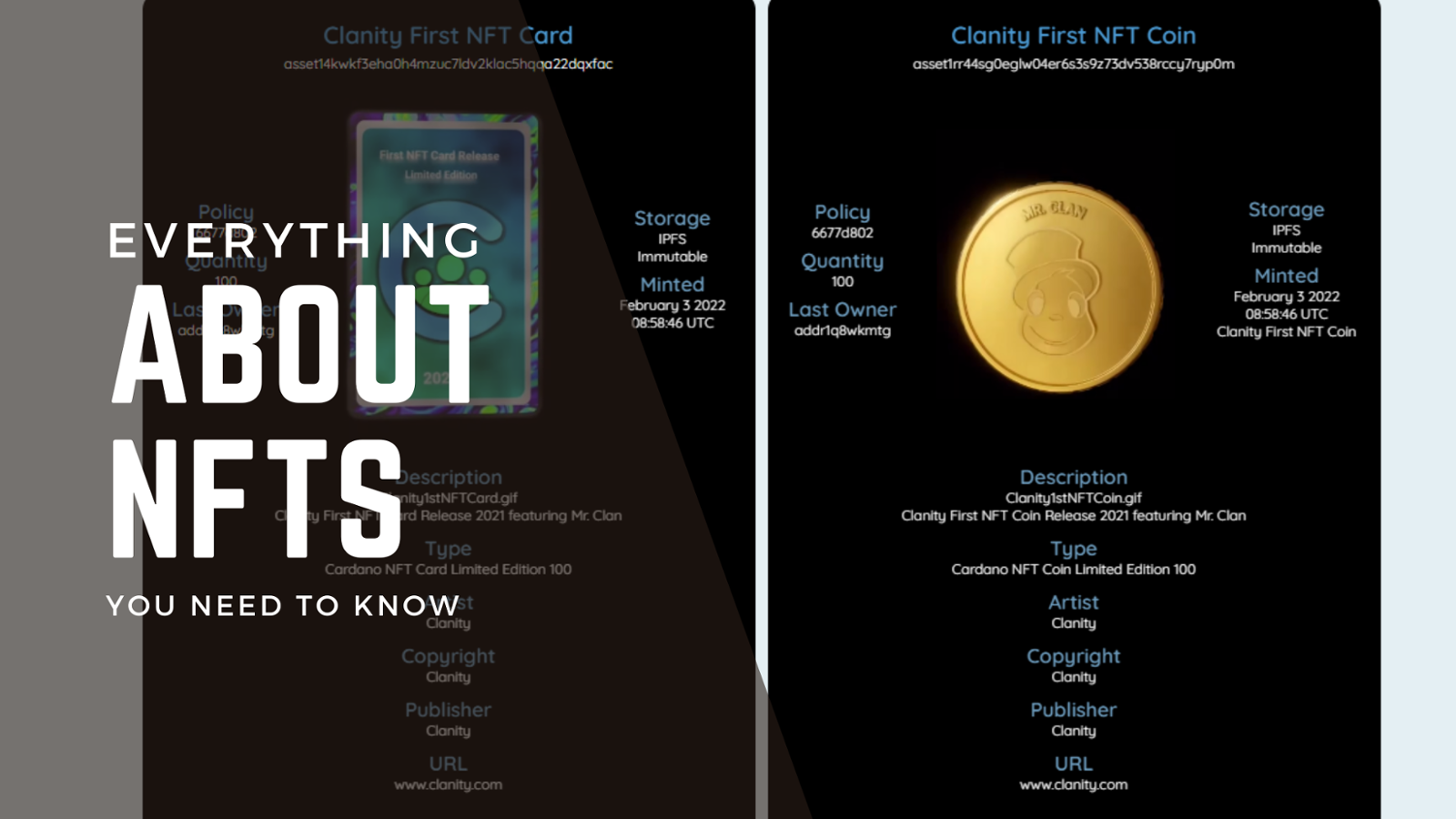
In recent years, non-fungible tokens (NFTs) have gained significant attention and have the potential to revolutionize various industries. Whether you're a newcomer trying to understand the basics or an experienced collector looking for the latest developments, this comprehensive guide will provide you with everything you need to know about NFTs.
What Are NFTs?
NFTs, or non-fungible tokens, are unique digital assets that are stored on a blockchain, which provides an immutable record of ownership. Unlike cryptocurrencies such as Bitcoin or Ethereum, which are fungible and can be exchanged on a one-to-one basis, each NFT has a distinct value and cannot be replicated or replaced.
NFTs can represent a wide range of digital or physical assets, including artwork, music, videos, virtual real estate, and even real-world assets like cars or yachts. The uniqueness and scarcity of NFTs make them highly desirable among collectors and enthusiasts.
To create an NFT, an individual or company selects a unique asset and "mints" it on a blockchain. This process involves associating the asset with a unique identification code and storing it on the blockchain, thereby verifying its authenticity and ownership. Once minted, NFTs can be bought, sold, and traded on various online marketplaces.
How Do NFTs Differ from Cryptocurrency?
While NFTs exist on blockchain platforms like Ethereum or Solana, they differ from cryptocurrencies in several ways. Cryptocurrencies like Bitcoin or Ethereum are fungible, meaning that each unit is interchangeable and has the same value. In contrast, NFTs are non-fungible, with each token having a unique value and properties.
Cryptocurrencies are primarily used as a medium of exchange or store of value, whereas NFTs represent ownership of a specific asset. While cryptocurrencies can be divided into smaller units, NFTs are indivisible and cannot be divided into smaller fractions.
Additionally, cryptocurrencies operate based on consensus mechanisms like proof-of-work or proof-of-stake, which secure the blockchain network and validate transactions. NFTs, on the other hand, rely on smart contracts, which are self-executing contracts with predefined rules and conditions.
Why Own NFTs?
There are several reasons why individuals choose to own NFTs:
Empowering Artists
NFTs provide artists with a new way to monetize their work and retain control over their intellectual property. Instead of relying on traditional art marketplaces or intermediaries, artists can directly mint and sell their creations as NFTs. This allows them to earn royalties from secondary sales and establish a direct connection with their audience.
Collectibility
Similar to collecting physical items like trading cards or artwork, NFTs offer a unique opportunity for collectors to build digital collections. The scarcity and uniqueness of NFTs make them valuable and desirable among collectors. Some NFT collections, like CryptoPunks or Bored Ape Yacht Club, have gained significant popularity and value.
Investment Potential
NFTs have the potential for significant returns on investment. High-profile sales, such as Beeple's artwork selling for millions of dollars, have attracted investors who see NFTs as a valuable asset class. However, it's important to note that the NFT market can be volatile, and investing in NFTs carries risks.
Community and Social Benefits
Many NFT projects have vibrant communities built around them. NFT owners can participate in exclusive events, access members-only content, and engage with like-minded collectors. Owning an NFT can provide a sense of belonging and connection within these communities.
Creating, Buying, and Selling NFTs
The process of creating, buying, and selling NFTs involves several steps:
Get a Crypto Wallet
To participate in the NFT market, you'll need a crypto wallet to store your NFTs and interact with blockchain networks. There are different types of wallets, including software wallets and hardware wallets. Software wallets are convenient for regular transactions, while hardware wallets offer enhanced security for storing valuable assets.
Acquire Cryptocurrency
To buy NFTs, you'll need to acquire the relevant cryptocurrency accepted on the platform or marketplace where you plan to make the purchase. Ethereum (ETH) is the most commonly used cryptocurrency for NFT transactions, but other blockchains like Solana or Tezos also support NFT trading.
Choose a Marketplace
There are several NFT marketplaces where you can buy and sell NFTs. OpenSea is one of the largest and most popular marketplaces, hosting a wide range of NFT collections. Other platforms like SuperRare, Rarible, or Foundation cater to specific types of NFTs or artist-centric sales. Research different marketplaces to find the one that aligns with your interests and preferences.
Mint or Purchase NFTs
If you're an artist or creator, you can mint your own NFTs by uploading your digital asset to a marketplace that supports minting. This process involves associating metadata and properties with the NFT. Alternatively, you can browse existing NFT collections on marketplaces and purchase NFTs directly from other creators or collectors.
Manage and Store Your NFTs
Once you own NFTs, they will be stored in your crypto wallet. Some wallets offer built-in NFT management features, allowing you to view, organize, and transfer your NFTs easily. It's important to keep your wallet secure and back up your wallet's recovery phrase to prevent any loss of access to your NFTs.
The Environmental Impact of NFTs
The environmental impact of NFTs has been a topic of discussion and concern. Early NFTs were primarily built on the Ethereum blockchain, which used a proof-of-work consensus mechanism that consumed significant amounts of energy. However, Ethereum has made significant strides in transitioning to a more energy-efficient proof-of-stake consensus mechanism.
The energy consumption of NFTs depends on the underlying blockchain and consensus mechanism. Some blockchains, like Solana or Tezos, use more energy-efficient mechanisms, mitigating the environmental impact. It's important to consider the environmental implications when participating in the NFT market and support projects that prioritize sustainability.
NFT Usage and Ownership Rights
NFTs offer unique opportunities for usage and ownership rights:
Digital Collectibles and Art
NFTs have become synonymous with digital collectibles and art. Owning an NFT grants you ownership and authenticity of a specific digital artwork or collectible. Artists can use smart contracts to include royalty mechanisms, ensuring that they receive a percentage of future sales, even if the NFT changes hands.
Virtual Real Estate and Metaverse
NFTs can represent virtual real estate or virtual assets within metaverse platforms. Platforms like Decentraland or Sandbox allow users to own and trade virtual land, which can be developed and monetized. NFTs can also serve as in-game assets, enabling players to own and trade unique items or characters within blockchain-based games.
Tokenization of Real-World Assets
NFTs have the potential to tokenize real-world assets such as real estate, luxury goods, or intellectual property rights. By representing these assets as NFTs, ownership and transactions can be recorded on the blockchain, providing transparency and reducing friction in traditional markets.
NFT Scams and Risks
As with any emerging market, the NFT space is not immune to scams and risks. It's essential to be aware of potential pitfalls and take necessary precautions:
Counterfeit NFTs
Counterfeit NFTs can be created by copying the visual representation of an NFT or falsely claiming ownership. It's crucial to verify the authenticity of NFTs and purchase from reputable sources or directly from the original creator.
Platform and Marketplace Risks
Not all NFT platforms and marketplaces have the same level of security and reputation. Research and choose platforms with robust security measures and a track record of trustworthy transactions. Be cautious of phishing attempts or fake marketplaces that aim to steal your funds.
Market Volatility
The value of NFTs can be highly volatile, with prices fluctuating based on market demand and trends. It's important to carefully consider the investment potential and risks associated with specific NFTs before making a purchase.
Tax Considerations for NFTs
The tax implications of owning and trading NFTs can vary depending on your jurisdiction. Owning an NFT may trigger capital gains tax liabilities when selling or trading the asset. It's advisable to consult with a tax professional or accountant who can provide guidance on the specific tax regulations and reporting requirements in your country.
A Brief History of NFTs
NFTs have a relatively short but impactful history. The concept of non-fungible tokens dates back to the early days of blockchain technology, but it wasn't until the introduction of the ERC-721 standard on the Ethereum blockchain in 2017 that NFTs gained mainstream attention.
Since then, NFTs have experienced explosive growth, with high-profile sales and collaborations capturing headlines. Artists, musicians, athletes, and even traditional institutions have embraced NFTs as a new medium for creativity, expression, and revenue generation.
The Future of NFTs
The future of NFTs is full of possibilities. As technology evolves and the blockchain ecosystem matures, NFTs are likely to become more integrated into various industries. We can expect to see advancements in areas such as gaming, virtual reality, fashion, and even the tokenization of real-world assets.
Regulation and standardization of NFTs will also play a crucial role in shaping the future of the market. As the industry continues to grow, it's important to strike a balance between innovation, consumer protection, and sustainability.
By grasping the concepts, risks, and opportunities associated with NFTs, you can make informed decisions and fully participate in this exciting digital ecosystem. Remember to stay informed, conduct thorough research, and engage with reputable platforms and marketplaces to make the most of your NFT journey.
Disclaimer: This article provides general information and should not be construed as financial or investment advice. Always do your own research and consult with professionals before making any investment decisions.
OUR OFFICIAL CHANNELS
Website - https://www.clanity.com/
Discord - https://discord.gg/6rDdVwextJ
Telegram - https://t.me/clanity
Twitter - https://twitter.com/clanityofficial
Facebook - https://www.facebook.com/clanityofficial
Linkedin - https://www.linkedin.com/company/clanityofficial/
Medium - https://medium.com/@clanity
Reddit - https://www.reddit.com/r/Clanity/
Instagram - https://www.instagram.com/clanityofficial/
Getting your business started with Blockchain?
Getting your business started with Blockchain?
Start the right way to do business with blockchain at Clanity!

